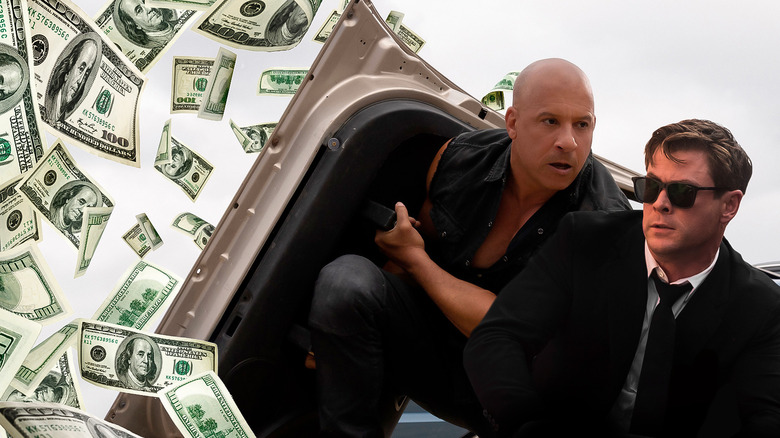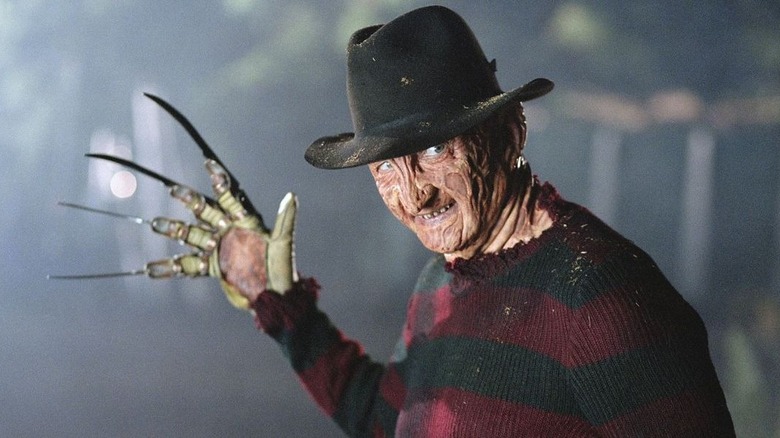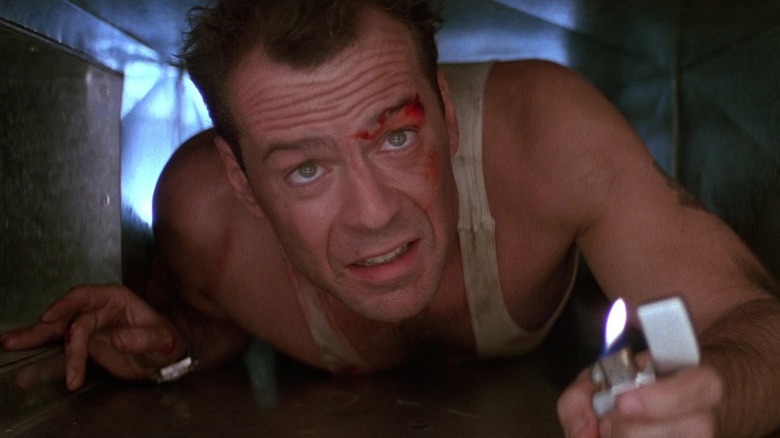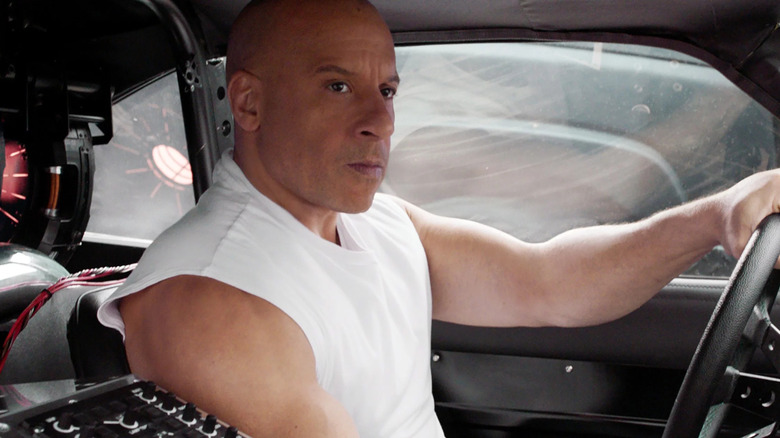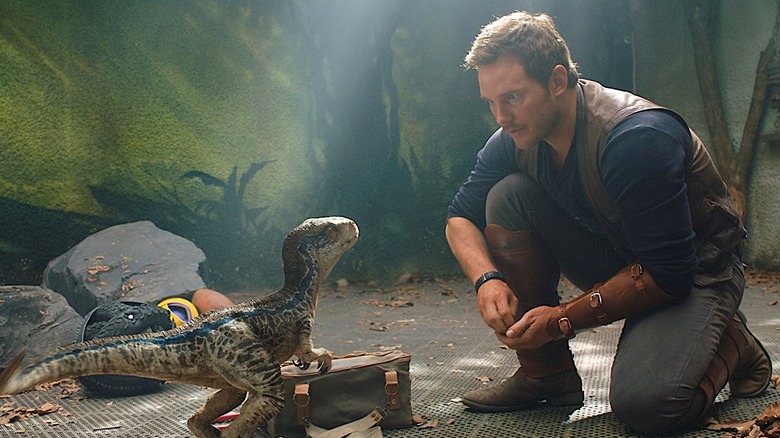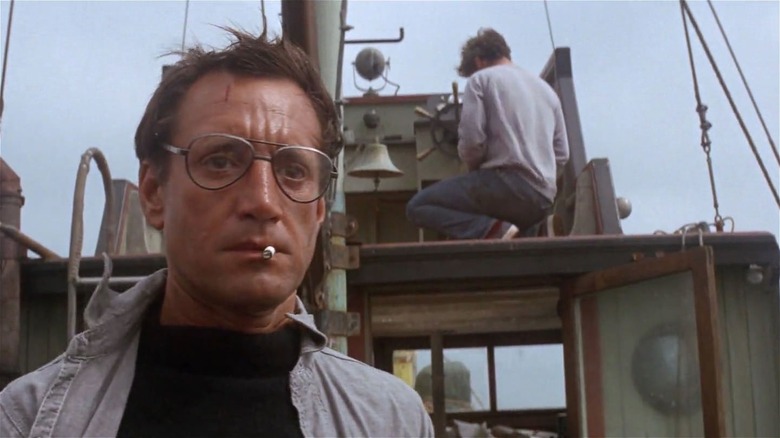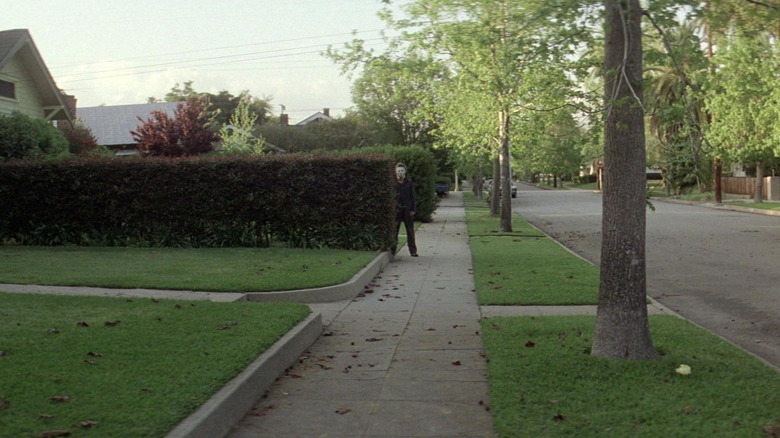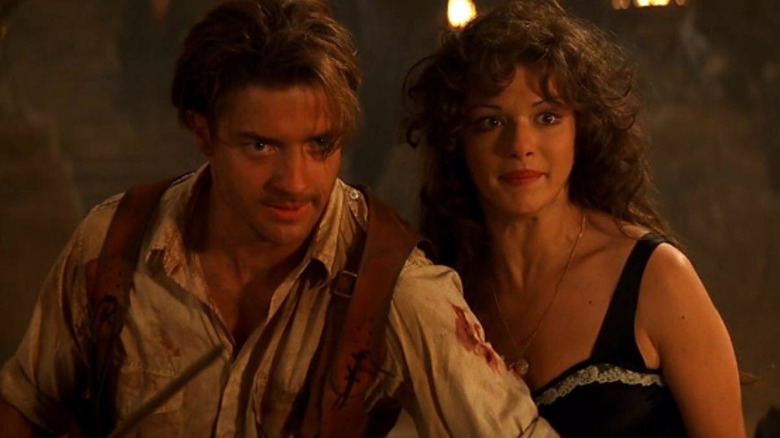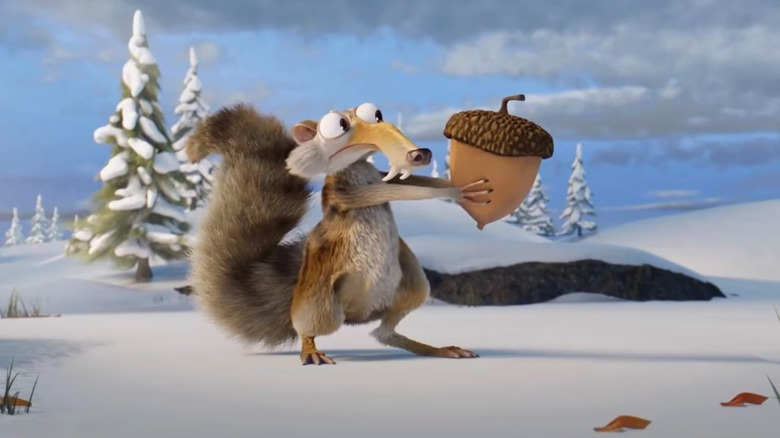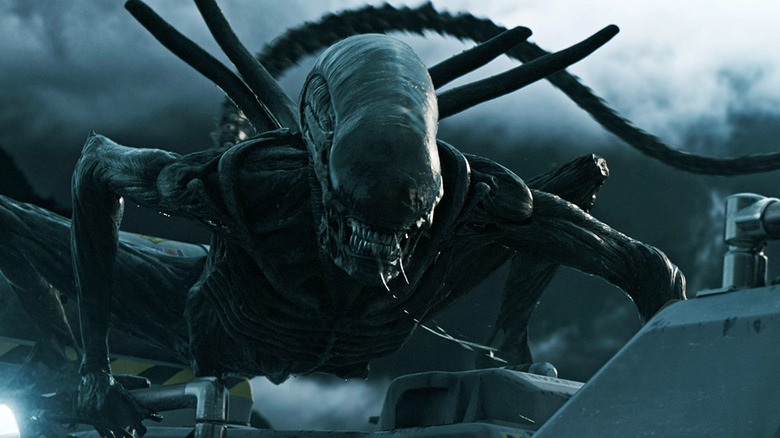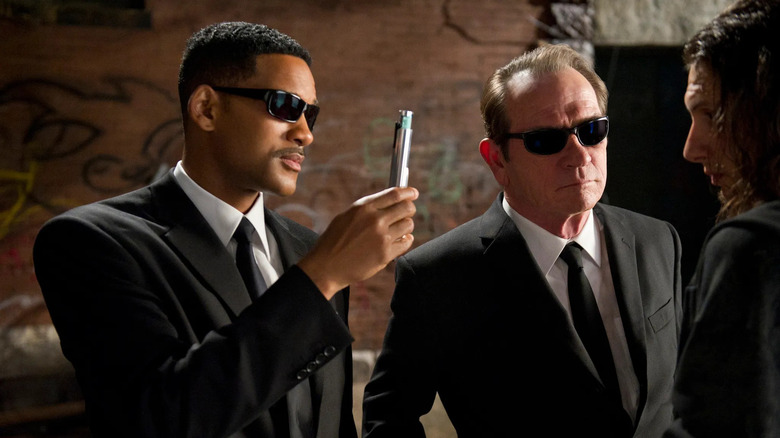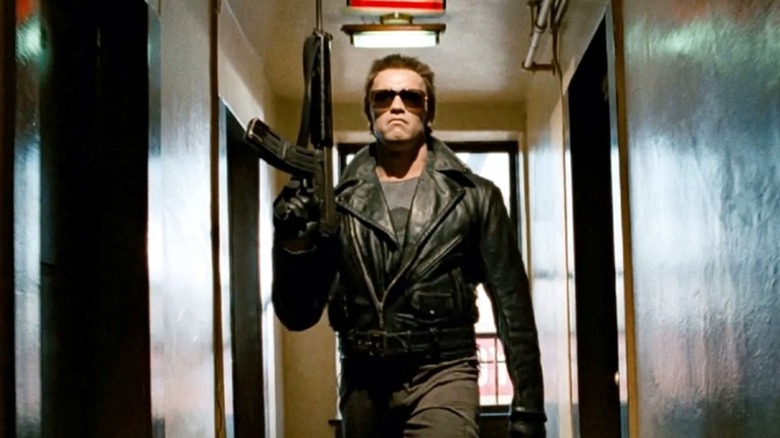Movie Franchises Ruined By Greed
The trend of studios trying to capitalize on the success of a breakout hit or sudden notoriety of a character isn't uncommon — and may even be more prevalent than ever. Just look at how fast "M3GAN" got a sequel or how Paramount plans to expand its success with "Sonic the Hedgehog" through a spinoff series starring Knuckles the Echidna. Whether it's a horror slasher who has killer potential to be legendary in pop culture or an action flick that features a crowd-favorite lead who could easily lead multiple films, studios will always try to maximize their profit however they can. Unfortunately, that doesn't always lead to success and more often results in big-name franchises falling apart.
As studios try to stretch a franchise out for financial gain through several sequels, there's usually a noticeable dip in standards. The story starts to become watered down to a singular concept and generally loses the intrigue or creativity that made the first film such a draw. By the time the franchise finally hits rock bottom or falls out of relevancy, the studios may have enough money to warrant their decisions, but fans are usually left feeling disappointed. With this pattern continuing as studios try to fill their wallets, it's worth looking at film franchises that have fallen victim to greed.
A Nightmare on Elm Street
When Wes Craven introduced the world to Freddy Krueger in "A Nightmare in Elm Street," he delivered New Line Cinema's first major success. Robert Englund's performance as Freddy immediately resonated with horror fans and boasted tons of potential to become something bigger. So, New Line developed many sequels and a slasher formula that could be easily repeated. While New Line saw a lot of lucrative triumphs from the franchise – which had the box office haul increase with each subsequent entry– the sequels it created often regressed from Craven's vision.
Each "Nightmare" sequel focused more on Freddy's quips and kills and less on telling a coherent story. His backstory became so incredibly confusing that it was eventually riddled with plot holes, and the characters were diluted to stock horror tropes. Some even believed that the slasher formula created for the "Nightmare" sequels caused the whole slasher genre to be ruined – largely due to the film's focus shifting away from the scares and more towards making Freddy the main selling point.
There's no debate that the original "Nightmare on Elm Street" has maintained its impact in the horror genre, or that Freddy has a spot on the Mount Rushmore of slashers. But New Line's determination to cash in on its hit totally drained the franchise of its creative power — which is probably why a second "Nightmare" reboot is residing in development hell.
Die Hard
The original "Die Hard" has remained as a genuine classic of the action genre. It's heavily recognized as Bruce Willis' highest-rated film and has maintained relevancy through a yearly tradition of people questioning whether it's a Christmas movie. Unfortunately, the "Die Hard" franchise name has been tarnished by needless efforts to enter the modern era of action.
While the initial films that followed the original managed to uphold the rough and tough tone that set "Die Hard" apart from other franchises, the more modern films stripped away those unique aspects. The persistence to keep this franchise alive to profit off its name and lead star power resulted in modern entries that were spectacle over substance. Both "Live Free or Die Hard" and "A Good Day to Die Hard" took away the more grounded feel of the action and protagonist John McClane, and turned everything into more generic action fodder. The latter film was so panned by critics and audiences because of this that it basically acted as the final nail in the franchise's coffin.
In a franchise overview for Flavorwire, writer Jason Bailey pointed out that the climax of "A Good Day to Die Hard" symbolizes where things went wrong: "It's exactly the kind of physics-defying superheroic feat that a movie like 'Die Hard' rebuked." Now, the hope for "Die Hard" to return has basically diminished, and given how forcibly made the modern entries were, maybe it's for the best.
The Fast and the Furious
Although "Fast & Furious" has become a widely recognized film franchise, it's faced plenty of roadblocks that should've stopped it by now. After the franchise became a blockbuster juggernaut with "Fast Five" — where racing took a back seat to over-the-top heists — it changed everyone's perspective. No longer was it seen as a cult franchise, and instead it started to be recognized as a film series that could rake in hundreds of millions of dollars with each entry. However, Paul Walker's death should've been the end of the "Fast & Furious" films since his absence was sorely felt and the franchise's soul had clearly been taken with him.
Once the "Fast & Furious" franchise perfected its heist formula and made "family" a common saying across the internet, Universal was ready to pump out sequels to continue its money-making agenda. Sadly though, it's only led to sequels that started to wear audiences down and emphasized the series' turn to upping the ante in the most ridiculous ways possible just to entice people to come. These characters have defied death so many times they might as well be considered super-human, which embodies how wildly absurd things have been lately. If the disappointment of "Fast X" at the box office as well as its lukewarm reactions from critics say anything, it's that Universal should've recognized that the franchise's glory days were long gone — mostly thanks to its own greedy oversaturation of these films.
Jurassic Park
Let's face it, the only reason that Universal has been so committed to keeping "Jurassic Park" around as a franchise is because Steven Spielberg's 1993 original was such a massive success. It continually smashed box-office records left and right and immediately gained widespread acclaim. However, Universal mostly failed at creating a worthy successor and has crafted a lot of sequels fans would rather forget. Both "The Lost World: Jurassic Park" and "Jurassic Park III" struggled to capture the awe of the original and instead focused on bland characters and lazily rolled through formulaic thrills. Neither film came close to reaching the same box-office heights the first film did and both are generally cited as terrible sequels (although some are coming around to "Jurassic Park III").
Then came Universal's attempt to revamp the franchise through the "Jurassic World" trilogy, which was financially successful but brought its own set of issues. While "Jurassic World" was seen as a strong refresh for the series, the two follow-up films — "Jurassic World: Fallen Kingdom" and "Jurassic World Dominion" — were seen as massive drop-offs. Overall, both films suffered from dull writing, bizarre plot directions, and overt silliness that took away the scary thrills that made the original great. In the end, Universal may have earned the money it wanted to with the "Jurassic" sequels, but it's left the franchise narrative a complete mess.
Jaws
Believe it or not, before "Jurassic Park" got ruined by greedy attempts to capitalize on sequels, another Spielberg classic — "Jaws" — had its legacy marred by pointless continuations. Like "Jurassic Park," "Jaws" was such a cultural phenomenon and record-breaking beast at the box office that Universal wanted to do everything it could to make as much as possible through unneeded sequels.
Regrettably, though, the sequels only detracted from the first film's success and turned the highly praised horror-thriller into a total joke. The sharp decline started with "Jaws 3-D" — a shameless attempt by Universal to be in line with the trend of 3-D making a comeback. In a review for Gone With The Twins, writer Mike Massie discussed how the film was the beginning of the end for the franchise by calling it, "an opportunity to capitalize on pre-sold audiences and the trend of 3D gimmicks for not only sequels but also, specifically, horror movie follow-ups."
However, the follow-up — "Jaws: The Revenge" — was the worst of them all. The film was a disaster in every facet and was widely panned for its baffling story filled with illogical psychic connections between a shark and a human and unbelievable efforts of revenge. There's no film like "Jaws" that's had its legacy ruined more by money-chasing sequels — which turned it into a franchise that never needed to exist.
Halloween
The first "Halloween" film has continued to influence the slasher genre for decades through its genuinely terrifying killer and effective scares, but was only followed by miserable confusion. While the first two films are adored by horror fans, they started a problem that eventually pinned the franchise into a corner. Writers-slash-producers John Carpenter and Debra Hill didn't want to continue Michael Myers' story since it ended in "Halloween II" and instead desired to take things in more of an anthology direction — which is why "Halloween III: Season of the Witch" doesn't have the masked killer. However, after "Season of the Witch" bombed and fans demanded that Michael be brought back, he was labeled as the face of the franchise — which led to many sequels and reboots.
Michael's forced return in "Halloween 4: The Return of Michael Myers" started many problematic trends in this franchise full of retconned story arcs, reboots, and just plain baffling ideas. Seriously, things got so bizarre that the fifth film featured a mute protagonist and hinted that Michael was a part of some weird cult. As things got more ridiculous in this franchise, the knee-jerk reaction was to just scrap everything and start over — which is why there have been so many complicated timelines established. The sequels reeked of desperation to keep Michael in the spotlight, and it caused the entire "Halloween" franchise to become one gigantic mess that no one seems capable of cleaning up.
The Mummy
Of all of Universal's classic monsters, there's no creature feature that the studio desperately tried to keep in the limelight more than "The Mummy." Once the era of classic monsters ended, Universal rebooted the franchise to great success with the 1999 Brendan Fraser-starring, action horror-adventure film "The Mummy."
The film instilled new energy and charm to the iconic franchise name and established new lore — not to mention that it made Fraser a blockbuster-leading star. However, the sequels couldn't avoid falling into the same terrible pitfalls that most entries on this list did and ultimately got worse as time went on. Both "The Mummy Returns" and "Tomb of the Dragon" caused the franchise to drift too far away from its horror roots, leaned too much into using gross-looking CGI, and depended too much on story formulas and stock spectacle to get by.
The franchise only dug itself deeper into despair with Universal's attempts to keep the franchise going through "Scorpion King" spinoffs – which also failed and only survived through crummy direct-to-DVD or video releases. Then, to top it all off, Universal attempted to bring the franchise back through the 2017 Tom Cruise-led reboot that was meant to kick off the Dark Universe. That reboot not only failed so hard that its box-office returns and reception are among the poorest of the franchise, but it also got the Dark Universe scrapped entirely. Universal's persistence to profit off "The Mummy" has only turned it into a cursed franchise that likely won't rise again.
Ice Age
Back in the early 2000s, "Ice Age" was a smash hit from Blue Sky Studios that basically put them on the map. It acted as a worthy competitor against films from Disney and DreamWorks and made Blue Sky a force to be reckoned with in animation. Fans loved the occasionally dark humor, contrasting personalities of its characters, and familiar yet sweet-feeling story of three unlikely allies going on a journey together. Plus, who didn't love seeing Scrat trying to obtain his beloved acorn? Unfortunately, the franchise was dragged through the mud through non-stop sequels that saw severe reductions in quality with each new entry.
While the first "Ice Age" was met with good praise resulting in a strong box-office performance, the others slowly had the franchise falling off a cliff — though not financially. Admittedly, the "Ice Age" franchise continued to put up strong numbers as more films got made, which eventually led the series to earn a total gross of $3.2 billion worldwide on a combined $430 million budget. Sadly, the quality of the films didn't keep up, and the franchise's final film, "Ice Age: Collision Course," earned an 18% critic's approval rating on Rotten Tomatoes – a dismal showing compared to the first film's 77% approval rating. So, despite the incredible box-office success of the "Ice Age" franchise, it's hard to be impressed with that achievement as it came at the cost of what made the first film so cherished.
Alien
Oh, where to begin with the "Alien" franchise? It started off incredibly well but faltered as Fox overplayed its hand on multiple occasions. Both "Alien" and "Aliens" were absolute hits that had major box-office glory and — in the case of "Aliens" — even saw Sigourney Weaver nominated for an Oscar. Then, "Alien 3" was on the horizon and went through a development hell like no other. Directors and writers walked in and out of the project like it was a revolving door and producers kicked around too many ideas for one to actually stick. Eventually, the film was made, but immediately drew criticism. Fans weren't happy when the beloved characters Newt (Carrie Henn) and Hicks (Michael Biehn) were unceremoniously killed off, along with other bizarre choices — both stylistically and lore-wise — that deviated from the franchise's craftsmanship.
The "Alien" franchise only got worse after the third film, and not even Ridley Scott's return could bring the series back to its heyday. From the divisive ways that Scott's modern films impacted the "Alien" lore to that weird Joss Whedon-led fourth film that featured a Xenomorph hybrid that's hard to take seriously, the blatant attempts to profit off this franchise turned it into an unmitigated disaster. However, there's hope reserved for Fede Alvarez's upcoming "Alien" flick — "Alien: Romulus" — to be as good as Scott apparently claims it is. If that is the case, then maybe it can start to wipe away the utter disappointment and confusion that's been conjured by awful sequels.
Men in Black
The magic of the first "Men in Black" film is something that's often imitated, but never duplicated. It brought together an unlikely onscreen duo in Will Smith and Tommy Lee Jones to deliver tons of laughs, and immersed fans into an alien world hidden right under our noses. It's no wonder that the 1997 classic became an instant success and earned quite a pretty penny at the box office. However, it was soon accompanied by subpar sequels that tried to recapture the essence and profitability of the original but rarely came close to achieving that goal.
In an interview with Den of Geek culture editor Tony Sokol, "Men in Black" screenwriter Ed Solomon discussed what he believed the franchise was all about. "I always felt like the secret to 'Men in Black' was not the sunglasses and the big guns and the coolness, and the other surface level coolness of it," Solomon said. "I always thought the secret of 'Men in Black' was the generosity of spirit."
Unfortunately, all the things that didn't define the original for Solomon became the franchise's identity — and it became very dull, very quickly. The charm and allure of the world faded fast and the focus on great characters became absent after a while. It's a big reason why the sequels never hit the same box-office marks as the original and lost their creative soul as more money-hungry installments got thrown into theaters.
Terminator
The "Terminator" franchise was a huge part of what made Arnold Schwarzenegger one of the biggest action stars of all time — and once had a great reputation of its own. The first two films are total classics for action fans and "Terminator 2: Judgement Day" has influenced and been referenced throughout many films. The respect and success "The Terminator" franchise once had was truly remarkable. But now, it's become a condemned franchise, destroyed by careless sequels that may have been lucrative at times but completely ruined the story. After "Terminator 2," the franchise never found its footing and tried everything to stay in the public eye. What remained consistent, though, was how the lore was continually messed with, and it only caused more confusion in the franchise.
From how "Terminator: Dark Fate" basically negated the beloved ending of "Terminator 2" to when "Terminator: Genisys" essentially asked fans to disregard the only two films in this franchise that worked, the sequels brought about a lot of problems. Although it was clear that "The Terminator" franchise should've stopped at the second film, Fox kept going, and while its clear goals of making money were inconsistently met, their efforts tanked this series to abysmal depths.
